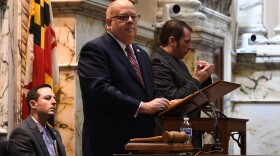The Maryland House of Delegates voted Monday largely along party lines to override 11 of Gov. Larry Hogan’s vetoes. The two most controversial were a massive education overhaul known as the “Kirwan” bill, and to help pay for it, a tax on digital products. WYPR’s Rachel Baye speaks with Nathan Sterner to give a refresher on these bills.
Let’s start with Kirwan. What does this bill do?
The bill — officially called the “Blueprint for Maryland’s Future” — is really a school system overhaul. One of its primary goals is to close achievement gaps, but it also raises academic standards and includes new accountability requirements.
Del. Alonzo Washington, a Prince George’s County Democrat who serves as vice-chair of the House Ways and Means committee, explained some of this at the start of the debate.
“The Blueprint will create a world-class education for all students by making historic investments in community schools in high-poverty areas, high-quality early childhood education and care, additional supports for students with disabilities and English language learners, college and career readiness supports, and innovative programming that so many of my colleagues here asked for,” Washington said.
The bill accomplishes this in part by changing the funding formula for public schools. At the end of a 10-year phase-in period, it’s expected to cost about $2.8 billion in state funding, plus another $566 million that local jurisdictions are expected to pitch in.
Hogan pointed to that high cost when he vetoed the bill last spring. Was that part of the opposition to Monday’s override vote?
Yes, that was a large part of it. Republicans argued, as they have for years now, that this legislation will necessitate tax increases.
Republicans also expressed skepticism that the bill will solve many of the challenges schools are facing, especially during the pandemic.
Del. Mike Griffith, a Republican representing parts of Cecil and Harford counties, highlighted the issues virtual learning has exacerbated.
“English-language learners are losing a necessary skill. Low-income students are not receiving the same education as wealthy students. Special needs students are suffering so much, like my own son, that virtual learning does not help,” he said.
Then again, these are the populations the bill is specifically designed to help the most.
It sounds like Republicans were at least partially right about the tax increase, because another veto the House voted to override is a new tax intended to help pay for Kirwan. Explain this new tax.
Currently, if you go to the store to buy a book or a DVD, you pay sales tax. If you buy an e-book or pay to buy or rent a movie digitally, you don’t.
This bill changes that. It extends the existing state sales tax to streaming services like Hulu, Netflix, and Spotify; e-books and music downloads; digital newspaper and magazine subscriptions; and internet greeting cards.
Supporters of this bill — mostly Democrats — argue that this isn’t a new tax, that they are updating the existing sales tax for the 21st century.
But many Maryland Republicans see it differently.
Del. Matthew Morgan, a Republican from St. Mary’s County, highlighted one example that is going to hit home with a lot of Marylanders during the pandemic.
“You go to the gym, you take a spin class, that's not taxed,” he said. “But if you took a class in your house on your gym equipment that you purchased and paid taxes on across a digital streaming service, like Peloton or Beachbody, or one of those, well, now you're paying tax.”
Revenue from the new tax is dedicated to the education reforms created by the Blueprint bill.
What comes next for these bills?
The Senate needs to override the vetoes, which could happen as soon as Tuesday. If those votes succeed, the bills become law 30 days later.













